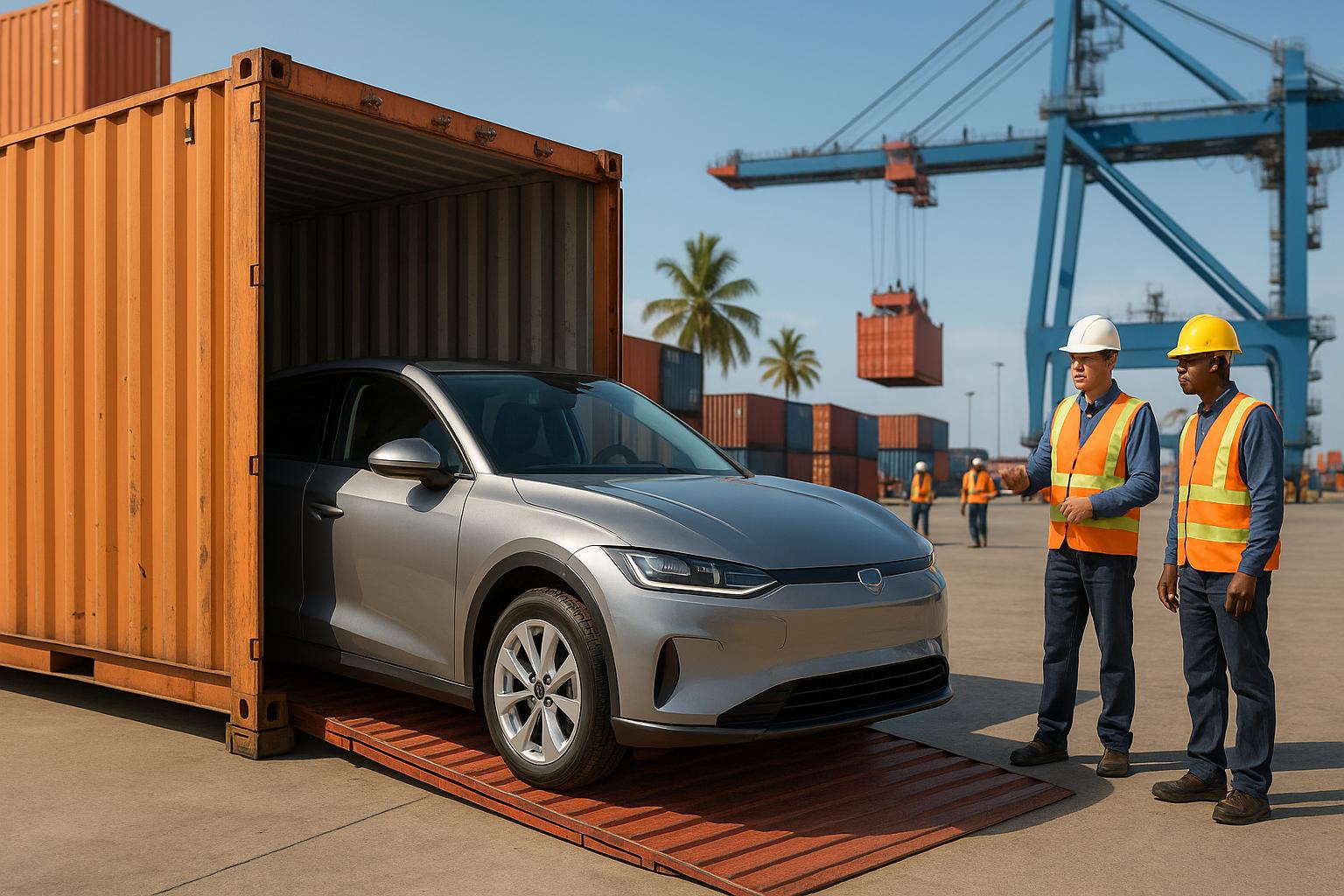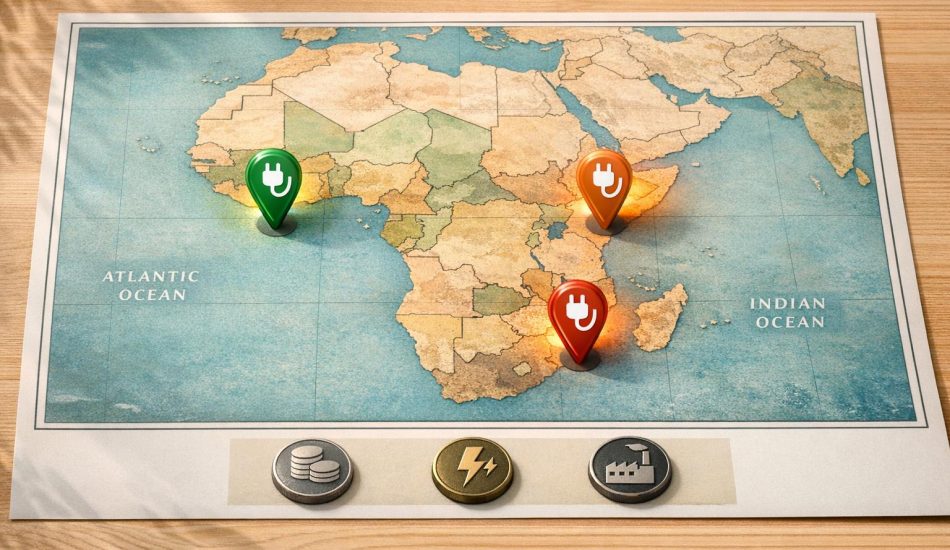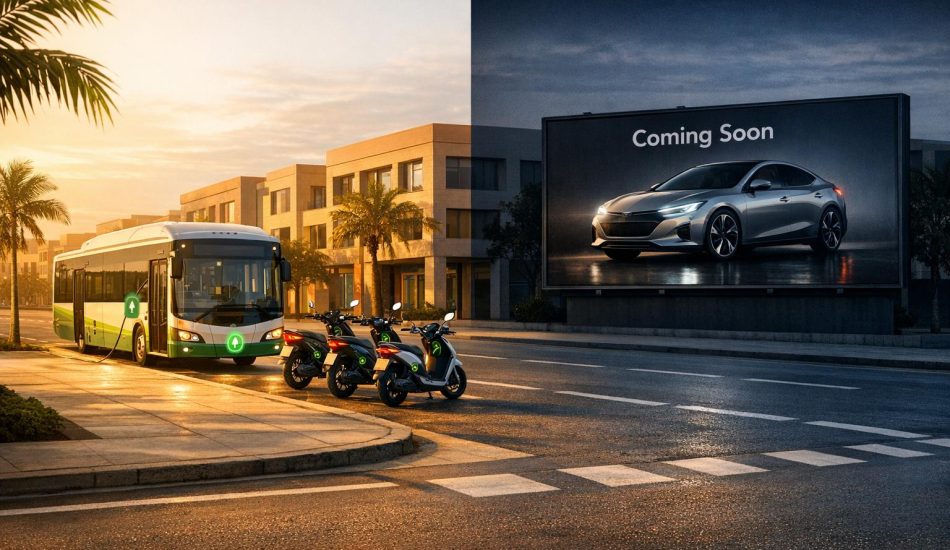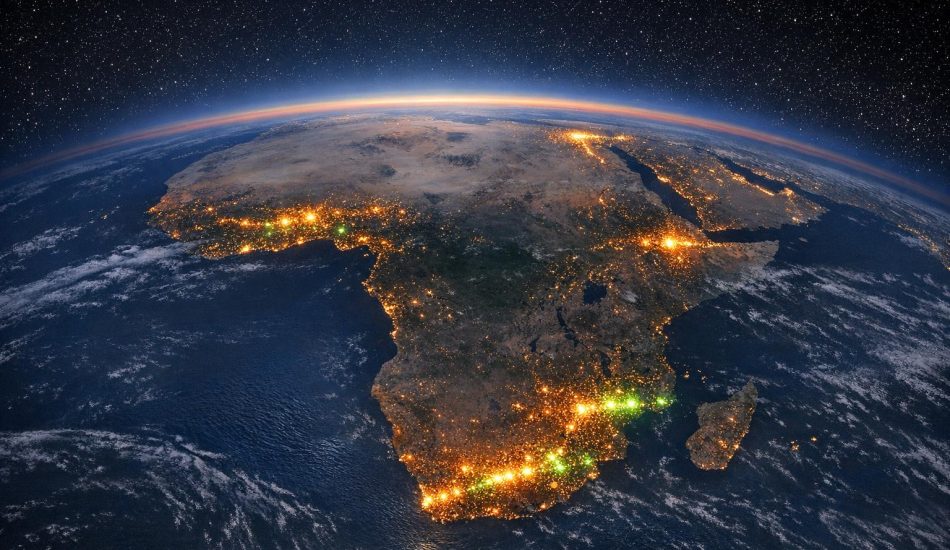
Want to import an electric vehicle (EV) to Liberia? Here’s what you need to know:
- Tax Savings: Fully electric vehicles are exempt from VAT and customs duties in Liberia, making them cheaper to import compared to gas-powered cars.
- Costs: Total costs include the EV price ($15,000–$80,000), shipping ($1,100–$4,850), insurance (1–3% of the vehicle’s value), and port fees ($500–$1,000).
- Shipping Time: Delivery takes 17–45 days depending on the port of origin.
- Required Documents: Certificate of Title, Purchase Invoice, Passport Copy, Driver’s License, Bill of Lading, and a Cargo Tracking Note (CTN).
- Vehicle Age Limit: Only cars 10 years old or newer are allowed.
- Best EVs for Liberia: Affordable options like the Nissan Leaf ($18,000–$25,000) or BYD Dolphin ($29,990) are ideal due to their durability and charging flexibility.
Quick Tip: Choose EVs suited for Liberia’s low rural electrification rates and tough road conditions. Models from BYD or Nissan are great for urban areas.
Why This Matters: Importing EVs supports Liberia’s goal to reduce greenhouse gas emissions by 64% by 2030 and promotes cleaner, more sustainable transportation.
Next Steps: Gather required documents, calculate total costs, and work with a reliable shipping company to ensure a smooth process.
Liberia CTN Procedure | Required for All Shipments to Liberia
How to Import an EV to Liberia: Complete Process
Bringing an electric vehicle (EV) into Liberia involves several steps, from selecting a shipping company to clearing customs in Monrovia. The entire process typically takes between 17 and 45 days, depending on the shipping route and method. For example, shipments from Newark may take 17 days, while those from New York can take up to 35 days. Below, we break down the process into manageable steps.
Required Documents and Registration
To successfully import an EV, you’ll need to gather specific documents required by Liberian customs:
- Certificate of Title and Registration
- Commercial or Purchase Invoice
- Copy of Passport
- Driver’s License
- International Insurance Policy (green card)
- Bill of Lading from the shipping company
Additional paperwork includes a Certificate of Origin, a Combined Certificate of Value and Origin (CCVO), and Liberia Customs "Form C". A Cargo Tracking Note (CTN) is mandatory and costs between $518 and $618. For electric vehicles, a Certificate of Conformity is required to confirm the EV meets Liberian standards. If the EV is used and valued at $3,500 or more, a pre-shipment inspection is mandatory under the National Port Authority‘s CTN/Advanced Cargo Declaration (ACD) system.
Shipping Options and Delivery Times
Once your documentation is in order, the next step is choosing a shipping method that aligns with your budget and timeline.
- Roll-On/Roll-Off (RORO): This is the most budget-friendly option, where the EV is driven directly onto the ship.
- Container Shipping: Offers greater protection for your EV but comes at a higher cost. Shared container services are also available for non-operational vehicles.
Delivery times vary by departure point. Shipments from Newark and Baltimore typically take 17–18 days to reach Monrovia. Routes from the West Coast, such as Los Angeles or Tacoma, and those from Savannah or Miami can take between 40 and 45 days. Jacksonville shipments arrive in about 20 days, while Houston shipments take roughly 25 days.
Most reputable shipping companies provide online tracking, allowing you to monitor your EV’s journey. Once your vehicle arrives in Monrovia, you’ll need to coordinate with a clearing agent to handle customs procedures and arrange final delivery.
Payment Methods
Shipping service payments can be made using wire transfers, certified checks, or credit cards for smaller amounts. Shipping costs generally range between $1,100 and $1,700. However, some routes are more expensive, such as East Coast shipments via BR Logistics USA Inc., which cost around $2,162, or West Coast shipments, which can reach $3,762. Norfolk shipments are among the highest, costing approximately $4,850.
Be aware of additional fees. For example, auto4export.com charges $395 or 3% of the vehicle’s value. Shipping insurance is another cost to consider, typically ranging from 1% to 3% of your EV’s value. Port charges, which fall between $500 and $1,000, will also apply. Always use secure payment methods and ensure you receive detailed receipts.
Once the vehicle reaches Monrovia, expect to pay a 10% import duty and a 12.5% VAT on imported vehicles. Factoring in these costs will give you a clearer picture of the total expense involved in importing your EV to Liberia.
EV Import Costs: Complete Price Breakdown
When importing an electric vehicle (EV) into Liberia, the total cost goes beyond just the sticker price. It includes shipping, insurance, and various administrative fees. Let’s break down these costs and see how they stack up for popular EV models.
Base Vehicle Prices
The starting price of an EV can vary widely depending on whether it’s new or used. Used EVs typically fall between $15,000 and $60,000, while new models range from $25,000 to $80,000. For example:
- A used Tesla Model 3 might cost between $35,000 and $45,000.
- New BYD models start at roughly $28,000.
- More compact EVs, like the Nissan Leaf, are often priced around $18,000 to $25,000.
Thanks to Liberia’s tax exemptions on EVs, these vehicles can be significantly cheaper to import compared to traditional gas-powered cars.
Shipping, Insurance, and Customs Fees
Beyond the vehicle’s price, there are additional costs to consider:
- Shipping Fees: Depending on the port, shipping method, and the size of the vehicle, shipping costs generally range from $1,100 to $4,000.
- Insurance: Shipping insurance is typically 1% to 3% of the vehicle’s value. For a $30,000 EV, this would translate to an insurance premium of $300 to $900.
- Port Charges: At Monrovia’s port facilities, handling and processing fees are usually between $500 and $1,000.
- Cargo Tracking Note (CTN): This mandatory document costs between $518 and $618.
For conventional vehicles, import duties (20% of the vehicle’s value) and VAT (10% of the combined vehicle value and import duty) would normally apply. However, EVs are exempt from these charges, making them much more affordable to bring into Liberia.
Total Import Costs by EV Model
Here’s a closer look at the estimated total import costs for some popular EV models, considering Liberia’s EV tax exemptions:
| EV Model | Base Price | Shipping & Fees | Insurance | Total Landed Cost |
|---|---|---|---|---|
| Nissan Leaf (Used) | $20,000 | $2,800 | $400 | $23,200 |
| Tesla Model 3 (Used) | $38,000 | $3,200 | $760 | $41,960 |
| BYD Atto 3 (New) | $28,000 | $3,000 | $560 | $31,560 |
| Hyundai Kona Electric | $32,000 | $3,100 | $640 | $35,740 |
These figures include the base price, shipping, and insurance. To put this into perspective, importing a conventional $30,000 vehicle would cost close to $45,000 after adding duties and VAT. In contrast, an EV with a similar base price would cost around $34,600, thanks to the tax exemptions.
Additional Considerations
While these estimates provide a good starting point, keep in mind that local registration fees and any required modifications could add to the final cost. Even so, the tax savings make EVs a more budget-friendly and appealing option compared to their gas-powered counterparts.
sbb-itb-99e19e3
Best Electric Vehicle Models for Liberia
Selecting the right electric vehicle (EV) for Liberia involves balancing affordability, durability, and charging compatibility. With Liberia aiming to cut greenhouse gas emissions by 64% by 2030 under the Paris Agreement, a few EV models stand out as ideal for the country’s unique needs.
Liberia’s EV market is evolving, thanks to efforts by companies like New Energy Electric Vehicles (NEEV), DENKI Electric Vehicles by Tuma Enterprises, Inc., and Emergi Liberia. Notably, Emergi Liberia has introduced solar-powered electric tricycles driven exclusively by women. These developments highlight the potential for both imported and locally tailored EV solutions to succeed in Liberia.
Model Comparison: Features and Prices
Here’s a quick look at some leading EV models:
| EV Model | Starting Price | Best For |
|---|---|---|
| BYD Dolphin | $29,990 | Budget-conscious buyers |
| Hyundai Inster | $39,000 | Buyers seeking additional features |
| Tesla Model 3 Performance | Approximately $88,000 drive-away | Advanced technology and extended range |
The BYD Dolphin, priced at $29,990, is an appealing choice for buyers on a budget, while the Hyundai Inster offers more features at $39,000. For those seeking cutting-edge technology and longer driving range, the Tesla Model 3 Performance is a premium option, though its price of around $88,000 drive-away places it in a higher tier. Meanwhile, local initiatives like NEEV and DENKI’s “work and pay” electric tricycle programs demonstrate practical and affordable EV solutions tailored to Liberia’s market. Beyond the sticker price, durability and charging flexibility are key factors for Liberia’s conditions.
Durability and Charging Requirements
Liberia’s infrastructure challenges make durability and reliable charging options critical when choosing an EV. These factors go hand in hand with the country’s broader EV import strategy.
With rural electrification rates remaining low, EVs designed to handle irregular charging and tough road conditions are essential. Chinese manufacturers like BYD have proven their vehicles’ resilience in emerging markets. For instance, in 2024, electric car sales in Brazil doubled, with over 85% coming from Chinese brands. This track record suggests that models like the BYD Dolphin are well-suited for Liberia’s environment.
To address electricity constraints, off-grid solar-powered charging stations are emerging as a practical solution. Buyers should prioritize EVs that can charge via multiple methods, from standard household outlets to faster charging systems, ensuring dependable performance even with inconsistent power availability.
The demand for efficient urban transportation is also clear, with approximately 22,740 tricycles registered in Liberia between 2018 and 2023. Compact EVs like the BYD Dolphin are a natural fit for Liberia’s urban areas, offering practicality and efficiency for daily commuting.
Liberia EV Import Rules and Government Policies
Liberia is setting the stage for a greener future by implementing policies that promote electric vehicles (EVs) while ensuring safety and compliance. These measures align with the country’s environmental goals and commitment to reducing emissions.
Liberia aims to cut greenhouse gas emissions by 64% compared to business-as-usual levels by 2030. The transportation sector is a key focus, with plans to decrease emissions by 15.1% through the introduction of EVs, particularly targeting rickshaws for private use.
Emissions and Safety Requirements
To improve environmental protection, Liberia is moving toward adopting Euro VI emissions standards. Currently, regulations require compliance with Euro 4/IV standards and a sulfur content cap of 50 ppm, though full implementation has faced delays. Upcoming policies will include mandatory inspections and SLCP (short-lived climate pollutant) labeling, signaling a more stringent framework.
For importers, aligning with Euro VI standards is essential to meet Liberia’s future regulations. The government is also working on legislation to enforce the 50 ppm sulfur limit for fuels, reflecting a comprehensive strategy to control transportation emissions.
All vehicle shipments to Liberia must comply with the Cargo Tracking Note/Advanced Cargo Declaration (CTN/ACD) system managed by the National Port Authority. Additionally, pre-shipment inspections are mandatory for goods valued at $3,500 or more, conducted by Bureau Veritas or BIVAC. These safety protocols, combined with other import requirements, ensure that only compliant vehicles enter the market.
Vehicle Age Limits and Certification Process
Liberia enforces strict age limits for vehicle imports, allowing only cars that are 10 years old or newer. This policy helps ensure that imported vehicles are safer and produce fewer emissions.
Importing a car requires several steps. An ECTN certificate is mandatory, along with other documentation such as import permits, a bill of lading, and proof of ownership. Importers must also secure the necessary licenses to import and sell used cars.
The CTN/ACD process must be completed online, with all required documents submitted for approval. This structured approach ensures that imported vehicles meet Liberia’s regulatory standards before they are allowed into the country.
Tax Benefits and Future Policy Changes
To encourage EV adoption, Liberia offers generous tax incentives. Fully electric vehicles are exempt from both VAT and customs duties, making them more accessible to importers. The government has also announced gradual reductions in import duties for traditional, hybrid, and electric vehicles.
The Investment Incentive Code provides additional benefits, such as exemptions from customs duties, income tax, and stamp fees for approved projects. Energy-related projects, including those focused on rural electrification and renewable energy, qualify for special tax incentives aimed at reducing import duties and GST.
Future policies are expected to offer further tax breaks for private-sector investments in energy. Businesses meeting specific criteria may qualify for benefits like tax holidays, reduced tax rates, and exemptions on duties and levies. To take advantage of these incentives, companies must register with the Liberia Revenue Authority (LRA), maintain accurate financial records, file timely tax returns, and comply with sector-specific requirements.
Conclusion: Your EV Import Checklist for Liberia
Here’s a handy checklist to guide you through importing an electric vehicle (EV) to Liberia, ensuring you make the most of the available benefits.
Importing an EV to Liberia comes with enticing tax breaks, including exemptions from VAT and customs duties. These savings can make switching to electric transportation more affordable, but don’t forget to account for these costs in your overall budget.
Stick to EVs no older than 10 years to avoid extra taxes. Proper documentation and thorough inspections are key to a smooth import process. Double-check that all necessary paperwork is completed and submitted correctly.
Liberia is actively encouraging EV adoption with supportive policies, including tax incentives and simplified customs procedures.
Pick your EV model carefully to align with Liberia’s infrastructure. With rural electrification still below 5%, it’s crucial to prioritize vehicles that offer flexible charging options and are built to last. Models like Emergi’s "Kekeh" electric tricycle highlight the growing options tailored to Liberia’s needs.
"Electric tricycles and motorcycles are not just eco-friendly alternatives to gas-powered vehicles; they are also more efficient, and fun to drive."
- Elvis Thomas, Head of Operations and Founder of Emergi Liberia
Factor in shipping, insurance, customs, and registration fees when calculating your total investment. These mandatory expenses can significantly impact your budget.
Platforms like EV24.africa can simplify the process by helping with document management and delivery support.
Finally, complete your import process by registering your vehicle with the Liberia National Vehicle Registration Office (LNVR) and obtaining your Certificate of Conformity. By following this checklist, you’ll not only ensure compliance but also contribute to Liberia’s vision of sustainable transportation.
FAQs
What are the steps to clear customs when importing an EV to Liberia?
Importing an electric vehicle (EV) to Liberia involves navigating a series of important steps to ensure a smooth customs clearance process. To get started, you’ll need to prepare and submit an import declaration along with key documents, including the bill of lading, commercial invoice, packing list, and a valid tax clearance certificate. These documents are essential for calculating customs duties, which must be paid at the customs office.
After payment, the vehicle goes through an inspection. If the value of the goods exceeds $3,500, a pre-shipment inspection might also be necessary. Additionally, securing an import permit is required before the clearance process can be finalized.
The timeline for customs clearance depends on the mode of transport. For air shipments, the process usually takes about 2–3 weeks, while sea shipments may require 3–5 weeks. Once customs clearance is complete, the EV is ready to be transported to its final destination in Liberia.
How can I make sure my EV meets Liberia’s emission and safety requirements before importing?
To ensure your electric vehicle (EV) complies with Liberia’s emission and safety standards, start by verifying that it meets regional environmental regulations like the ECOWAS harmonized standards. These standards require vehicles to achieve EURO 4/IV emission levels, aligning with Liberia’s air quality and environmental protection laws.
On the safety side, confirm that your EV undergoes a comprehensive roadworthiness inspection and adheres to Liberia’s safety regulations. It should meet both Liberia National Standards and any relevant international safety requirements. Taking these steps in advance can save you from unnecessary delays or unexpected costs during the importation process.
What should I consider when selecting a shipping company to import an EV to Liberia?
When selecting a shipping company to import an EV to Liberia, focus on experience and dependability. Choose a provider with a solid history of handling international vehicle shipments, especially to West Africa. Customer reviews can provide valuable insights into the quality of their services.
Look for companies that offer clear pricing, comprehensive insurance coverage, and real-time tracking. Verify that they adhere to international shipping standards and have a strong record of timely deliveries. Reading testimonials and investigating their reputation can give you peace of mind.
By keeping these factors in mind, you’ll set yourself up for a smoother and more secure EV import experience.




